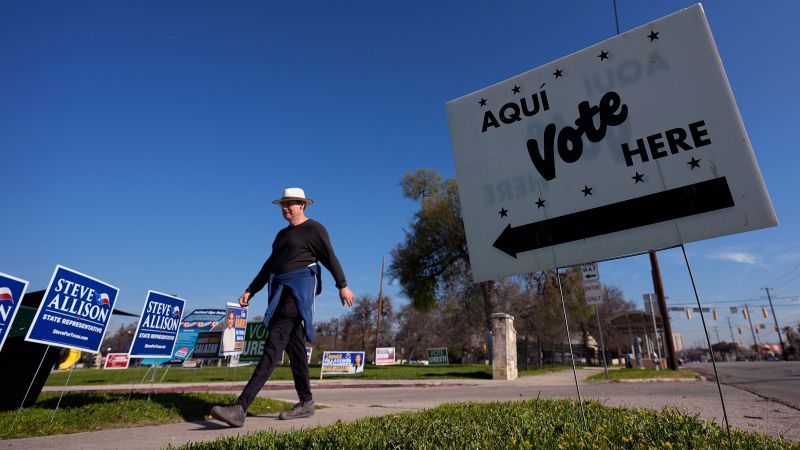A version of this story appears in CNN’s What Matters newsletter. To get it in your inbox, sign up for free here.
It’s an important new phase of presidential primaries, when the early contests are over and voters from multiple states cast ballots in primaries timed to occur on the same date.
It’s called “Super Tuesday,” and it is important even though neither Democratic President Joe Biden nor former President Donald Trump has had to sweat the competition this year. Primaries on Tuesday may offer the final opportunity for former South Carolina Gov. Nikki Haley’s quixotic and lackluster effort to challenge Trump for the Republican presidential nomination.
Instead of a single primary or caucus, Super Tuesday lumps together 15 contests for Republicans and 16 contests for Democrats spread across the country.
More than a third of Republican delegates are at stake along with an equally large portion of Democratic delegates. Both Biden and Trump are undefeated so far in primary contests this year. They will look to keep those streaks alive.
A large sample of the country will have contests on Super Tuesday – red states and blue states from the North, South, East and West.
The primaries at stake include the first three states in the alphabet, as any schoolkid should be able to tell you: Alabama, Alaska (for Republicans) and Arkansas. In addition, there’s California and Colorado; Maine, Massachusetts and Minnesota; North Carolina; Oklahoma; Tennessee and Texas; Utah; and Vermont and Virginia.
Tuesday also marks the end of Democrats’ mail-in presidential preference process in Iowa, and a Democratic caucus in American Samoa.
How did Trump and Biden perform in earlier Super Tuesdays?
In 2016, Super Tuesday was the moment when Trump really seized control of the Republican primary. Trump won 7 of the 11 contests that day, although he lost the largest prize, Texas. There was still a spirited race for delegates in 2016, as opposed to this year, when Trump has won every contest before Super Tuesday and has a growing delegate lead over Haley.
In 2020, Biden won 10 of 14 contests on Super Tuesday. He has not faced any serious competition from Democrats this year and is expected, as is traditional for incumbents, to win every contest Tuesday.
For Republicans, the question is whether Haley can gain any traction whatsoever. She has not yet won a primary or caucus, and she is falling far behind in terms of delegates, but Haley insists that Republicans deserve a second option. Barring some unforeseen eruption of support for Haley, will a setback on Super Tuesday push her out of the race?
For Democrats, Biden is coming off a wake-up call in Michigan. He won the Democratic primary there easily, but more than 100,000 Democratic primary voters chose “uncommitted” rather than Biden. “Uncommitted” won two of Michigan’s delegates, the only delegates Biden has lost so far.
As the Palestinian death toll in Gaza exceeds 30,000 people, the Democratic primary voters in a state with a strong Arab and Muslim population were protesting the president’s Israel policy and want him to push much more forcefully for a ceasefire between Israel and Hamas. Are there signs of more protest on Super Tuesday?
Meanwhile, neither of the Democrats challenging Biden has gained much traction. Rep. Dean Phillips has failed to get out of the single digits in states where Biden has campaigned. One former, fringe rival, Marianne Williamson, has actually taken the unusual step of unsuspending her campaign.
Not technically on Super Tuesday. Neither candidate can win a majority of the delegates until later in March, with both candidates likely to pass the “magic number” on March 12 or March 19.
Trump will need to win 1,215 of 2,429 delegates, while Biden needs 1,968 out of 3,934 delegates.
Regardless, primaries will continue until early June. Conventions don’t take place until July for Republicans and August for Democrats.
The modern primary system has only grown up in recent decades. Super Tuesday has grown with it. The term was first used in the 1980s. Democrats in Southern states, wanting a moderate candidate, timed their primaries for more power in the process. It has not always achieved that goal.
Then-Massachusetts Gov. Michael Dukakis, a liberal, largely put the 1988 Democratic primary away with victories on Super Tuesday. In 1992, however, then-Arkansas Gov. Bill Clinton completed his comeback by sweeping Southern states on Super Tuesday that year.
In 2008, 21 states held contests on a Super Tuesday in early February, an example of front-loading the primaries. But then-Sens. Barack Obama and Hillary Clinton split the delegates among Democrats. Sen. John McCain decisively pushed former Massachusetts Gov. Mitt Romney from the GOP race.
Read the full article here
